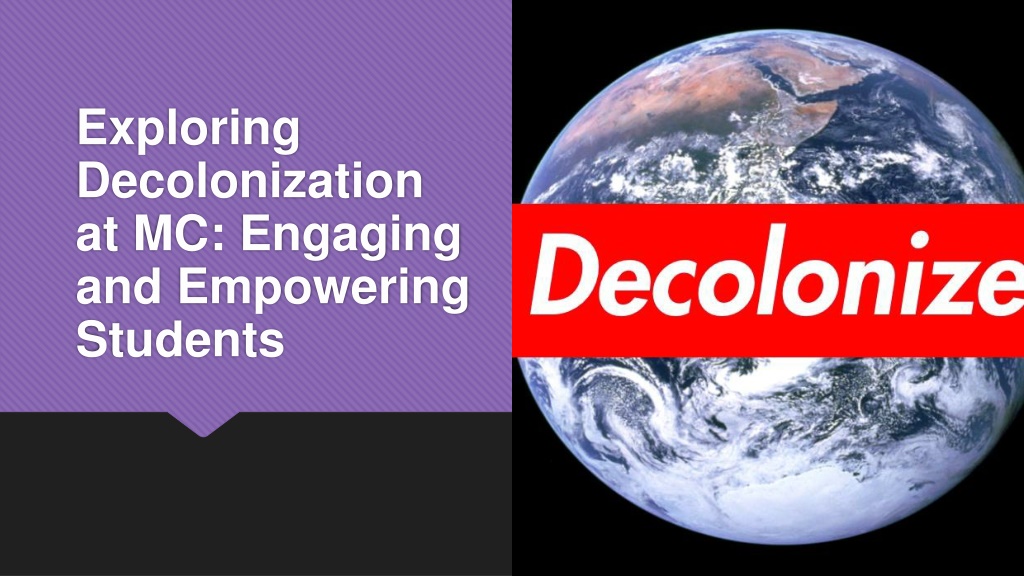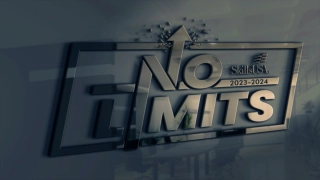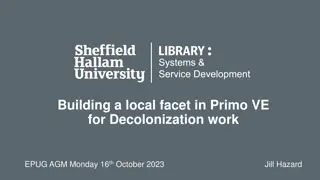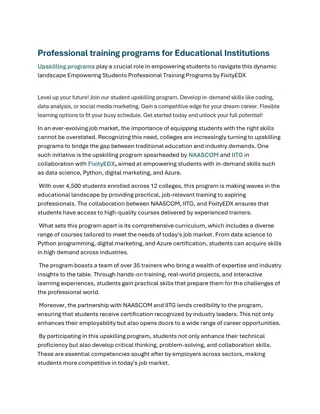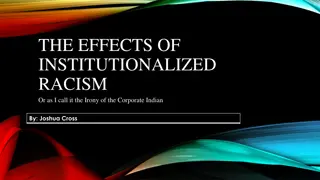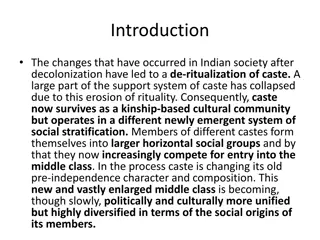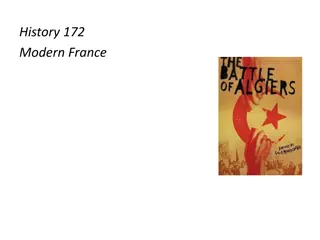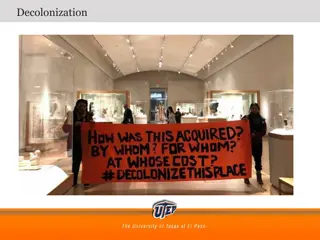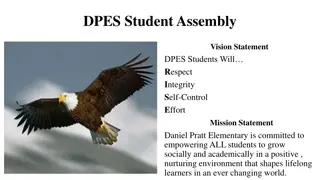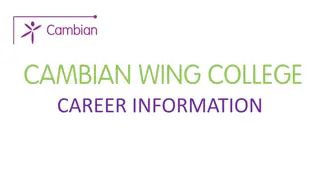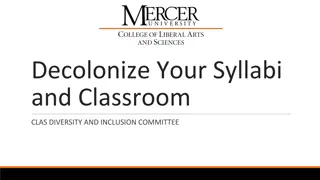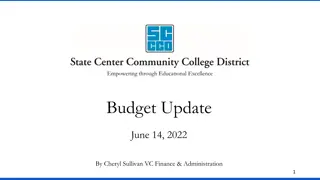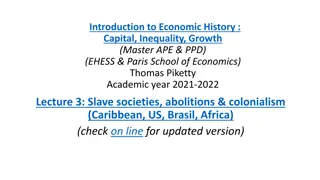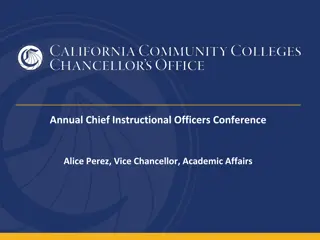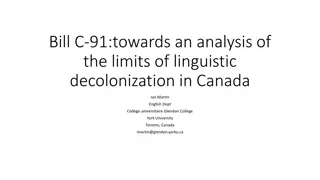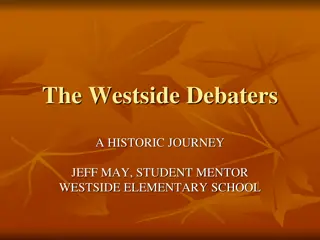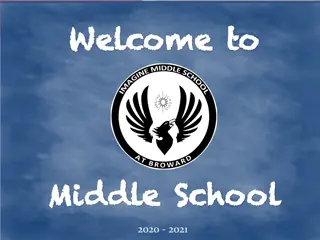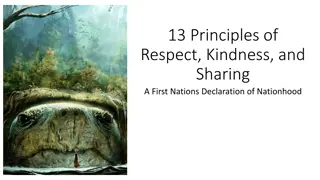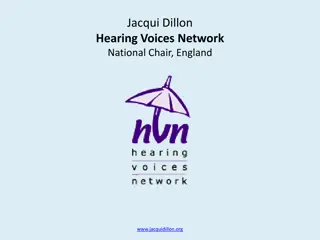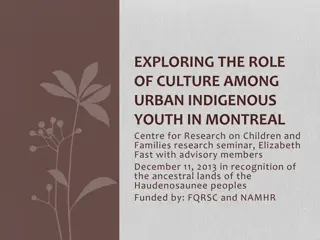Empowering Students through Decolonization at MC
Explore decolonization at MC by reflecting on student feedback, empowering students to take an active role in decolonizing higher education, and integrating Indigenous knowledge. Learn how to solicit and use feedback effectively to create an inclusive and engaging learning environment.
Download Presentation

Please find below an Image/Link to download the presentation.
The content on the website is provided AS IS for your information and personal use only. It may not be sold, licensed, or shared on other websites without obtaining consent from the author. Download presentation by click this link. If you encounter any issues during the download, it is possible that the publisher has removed the file from their server.
E N D
Presentation Transcript
Exploring Decolonization at MC: Engaging and Empowering Students
Outcomes Reflect on student feedback to identify ways to empower and engage students Identify ways students can take an active role in decolonizing higher education at MC
Recap: What is decolonization? Decolonization is the process of deconstructing colonial ideologies of the superiority and privilege of Western thought and approaches. Decolonization involves valuing and revitalizing Indigenous knowledge and approaches and weeding out Western biases or assumptions that have impacted Indigenous ways of being (Cull et al., 2018, p. 7). Cull, I., Hancock, R. L. A., McKeown, S., Pidgeon, M. & Vedan, A. (2018). Pulling together: A guide for front-line staff, student services, and advisors. Victoria, BC: BC campus. https://opentextbc.ca/indigenizationfrontlineworkers/
Recap from previous workshop Get to know students names and build relationships Engage in self-reflection Teach about decolonization Offer choices Change the structure of the room Ask questions that promote critical thinking about the content Address the knowledge- power dynamic Engage student voices Adopt alternative assessment techniques
Indigenous Education Values the Student Voice The needs of the whole student is the base consideration in Indigenous descriptions of education, and the guiding principle in Indigenous conceptions of student achievement. student voice/experiences are recognized as integral to the construction of active knowledge People for Education. (2022). Embracing Indigenous worldview and quality learning environments. Website. https://peopleforeducation.ca/report/what-matters-in-indigenous- education/#chapter4
Integrate opportunities for student feedback Invite student feedback that address decolonization principles. For example: Are multiple voices or perspectives represented in the content? If not, please suggest which voices are missing. Do you have questions about how/why the content was chosen? Consider the feedback from students when planning subsequent classes and assignments, and acknowledge how you used the feedback
How do you solicit feedback from your students, and how do you use that feedback? Post responses in chat
How to Engage and Empower Students to Promote Decolonization Practices 1. Syllabus statement 2. Use storytelling to share knowledge 3. Student passion projects 4. Service Learning
Syllabus Statement Include a statement in the syllabus that acknowledges decolonization and the importance of students voices. The statement can address the following: what decolonization means the value of student voices resources in the college and community that give students the opportunity to engage in decolonization work (Note: We can build a collection of resources together.)
What resources are you aware of (at the college or beyond) that could engage students in decolonization work? Post responses in chat
Incorporate Storytelling Indigenous education values sharing knowledge through storytelling. Invite students to share their stories and experiences to promote receptive listening and empathy. Use students' stories of lived experiences as classroom material by connecting it to the course outcomes. Set guidelines to facilitate student sharing in a judgment-free environment. (See page 5 of Engaging Adult Learners for more details about narrative learning.)
NUTR101 Nutrition Reflection Essay#1: Food Memory (Professor Sara Ducey)
NUTR101 Nutrition Reflection Essay#1: Food Memory (Professor Sara Ducey)
Post in Chat Consider the example from the nutrition course. What food memory story would you tell? What type of story could you invite students to share for your course, and how could those stories be used for further learning?
Passion Projects Passion projects are project-based learning activit[ies] in which students research any topic they are passionate about and create a project to share with the class, the school, the community....the world! Google popularized passion projects through by allowing employees to spend 20% of work time on a project of personal interest. (Some companies, allow 60 minutes per week for Genius Hour) Passion Projects are designed to tap into the things that make our students heart race, their eyes light up, and their engagement increase to maximum levels. (Aierstock, E., 2019) (Source: Aierstok, E. (2019). How I use passion projects to deepen my students relationship with reading. How I Use Passion Projects in Independent Reading - WeAreTeachers (Source: Passion Project. (n.d.). https://sites.google.com/camas.wednet.edu/passionproject/home )
Passion Projects Process: Choice (connect to standards of learning) Deep Learning Progress Checks Let Go Celebrate Process: Brainstorming Topic approval Research Document process Project Presentation (Source: Aierstok, E. (2019). How I use passion projects to deepen my students relationship with reading. https://www.weareteachers.com/passion-projects-independent- reading/#:~:text=Explain%20that%20a%20passion%20project%20is% 20a%20project,passion%20to%20reflect%20your%20understanding% 20of%20your%20novel%3F) (Source: Passion Project. (n.d.). https://sites.google.com/camas.wednet.edu/passionproj ect/home)
What would you have to consider if implementing a passion project in your course? Post responses in chat This Photo by Unknown author is licensed under CC BY.
Service Learning: Decolonized Service Learning Rethinking the idea of service by viewing members of the community as teachers and allowing the narrative to emerge from that community (versus an exploitative or saviorism approach) [Cornell ILR Buffalo Co-lab. (2020). Decolonizing service learning. YouTube video. https://youtu.be/x_QbvYc- J7I?t=4206] Coalitional activism, which encourages students to think about how oppression on the basis of race, gender, and class function together to suppress voices from the margins and think about ways to build coalitions with others, then act [Mills College. (2020). Challenging classroom colonialism and the problem with decolonizing education. Blog. https://online.mills.edu/blog/decolonizing-education/) Relational learning, the active process of co-constructing knowledge not only in the classroom but outside in the world. [Taos Institute. (2022). Relational learning in education. https://www.taosinstitute.net/resources/relational- learning-in-education.]
Service Learning MC has a service learning program led by part-time services learning coordinators on each campus. Take a few minutes to review the program page. https://www.montgomerycollege.edu/life-at- mc/student-life/service-learning-civic- engagement.html
How might you use MCs resources to engage students in a decolonized service learning project? Post responses in chat
